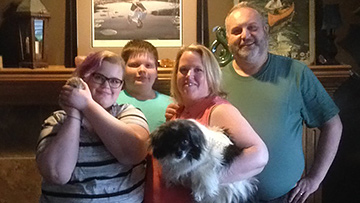Collaborating for success in transforming service to Canadians
Each day, the Government of Canada interacts with millions of Canadians by delivering services that play important roles in their lives. They expect high-quality, easy-to-access, simple and secure services that are responsive to their needs, whether they are offered online, through call centres, or in person.
Budget 2016 highlights the importance of service delivery for the Government of Canada, and public servants across the Government are focused on transforming what we do and how we operate in order to provide a better service experience. As the face of Government of Canada services for many Canadians, ESDC is playing an important role in the advancement of government-wide initiatives.
As an organization dedicated to service excellence, we are listening and working with Canadians to respond to their current and emerging needs. Across our portfolio, we have been collaborating with our partners to modernize the way we work and to build on our successes.
A high performing organization is built on employee engagement, a culture of excellence, demonstrated leadership, and a strong workplace and workforce. To achieve this, everyone in the organization needs to collaborate, share the same vision and value each other's contributions.
We are putting forward the ESDC Service Strategy to serve as a department-wide modernization plan of action which embraces our commitment to service excellence and transforms the way we deliver services to clients, employers, communities and organizations.
Video: Stories of Excellence: Collaborating for Success
Transcript of video: Stories of Excellence: Collaborating for Success
The public service is all about serving Canadians and that’s what we’re here to do. And we want the best possible outcomes for Canadians, we want the best possible policies for Canadians, the best possible service delivery. And I really think that actually Employment and Social Development Canada is more about that than potentially others.
The notion of we’re constantly pushing to innovate, but improve, and so excellence tends to come through. It comes through in our communications, it comes through in the way we put the bundle of services together. And I think that’s obviously something that is driven by a culture that is motivated by strong values around quality.
Another really important thing is to have employees who are involved, committed and passionate. So in terms of recruitment, it’s really important to have a recruitment process that helps us hire people who really want to work for the Department, who want to do their very best to serve Canadians.
I am just so excited to see the passion, the commitment, the excitement of people about saying, “Serving Canadians matters and serving them well is an opportunity that I have to make a difference.”
It’s not just a transaction. Often, it’s services that, like you mentioned, have an impact. It’s an important moment in someone’s life, and if we don’t do the best possible job, they’ll remember that for a long time.
For me, there is a very direct line of sight from there to all the good thinking that has gone into our service strategy, because that is all around how do we work as a united entity, where it’s not me and my team against Benoît and his team because who’s better. It’s about who are we serving and what’s the way we can work together to do our best possible job.
The principles of openness and collaboration, whole-of-government, smart use of technology, embracing the diversity of talent that we have available is absolutely core. And living it means really living the Blueprint vision, owning it and it’s just internalizing it and making it your own. And sharing it is making sure all employees have access to this idea of Blueprint and engagement, ensuring that employees are engaged.
And especially our front-line managers—what tools can we give them to better support them in their day-to-day work?
I think another strength of the Blueprint initiative was that it was really a ground-up exercise. It was also about ensuring that operational, regional employees had a sense that they were empowered to make a difference at all levels. I think leadership is at all levels.
The next stage is really hard. And the hard part is really saying, “Well, we can’t just do the same thing all over again, because we just opened up a whole conversation about how different we should become.”
It is absolutely clear the context around this is changing. We have changing expectations of Canadians, we have issues becoming more complex, we have the Government is very interested in a service delivery agenda. And in that context, with everything we had to do in the transformation that we had to undertake, I believe we needed a strong focal point, an area that was going to push transformation forward.
The front-line person who’s going to look at all this entire service strategy and say, “How does that affect me in my job in order to enable and support citizens?” Then they know that it’s organized. We’re doing this because expectations by citizens are increasing quickly. The Government is actually moving very fast in this space, they believe in service, which is a very important step obviously. And that means we have to act as quickly as possible.
At the core of it, if we think that this is important, that service to Canadians is important, we have to organize ourselves for success.
Meet motivated employees who are dedicated to service
Testimonial from Quebec Region

Brahim Benyousef describes his experience welcoming Syrian refugees in Montreal.
Going the Extra Mile

Gloria Allen is a team leader at the Inuvik Service Canada Centre
Support for Fort McMurray

A testimonial on the impact of supporting Canadians through extremely difficult events.
Page details
- Date modified: